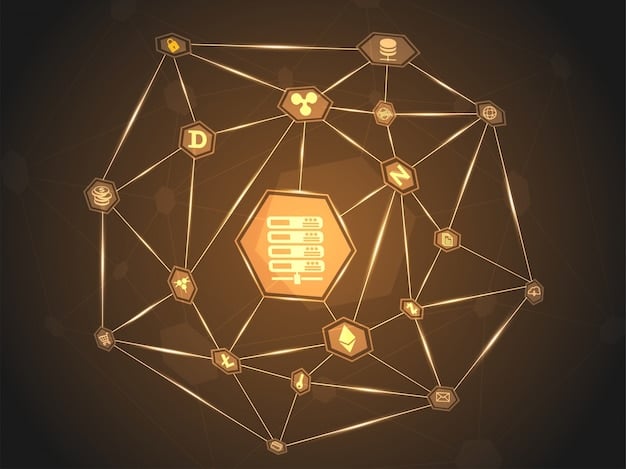Blockchain Beyond Crypto: 3 Real-World Tech Applications in the US

Blockchain technology extends far beyond cryptocurrency, offering secure and transparent solutions for supply chain management, healthcare data management, and digital identity verification, revolutionizing how US tech professionals approach data handling and security.
The term **Blockchain Beyond Cryptocurrency: 3 Real-World Applications for US Tech Professionals** often conjures images of Bitcoin and other digital currencies, but the technology’s potential stretches far beyond the realm of finance. This article explores three impactful real-world applications of blockchain technology poised to transform various sectors within the US tech landscape.
Beyond Bitcoin: Unlocking Blockchain’s Potential
While cryptocurrencies brought blockchain into the mainstream, the underlying technology offers a robust and secure framework for various applications. Its decentralized and transparent nature makes it ideal for solving critical challenges in industries beyond finance. Let’s explore how blockchain is being utilized to improve efficiency, security, and trust in different sectors.
Blockchain technology is rapidly evolving, and its adoption is steadily increasing across diverse industries. Understanding its broader applications is crucial for US tech professionals looking to leverage this transformative technology.

Supply Chain Revolution: Enhanced Transparency and Traceability
One of the most promising applications of blockchain lies in revolutionizing supply chain management. The current systems often involve complex networks with limited transparency, making it difficult to track products and verify their authenticity. Blockchain offers a solution by creating an immutable and transparent record of a product’s journey from origin to consumer.
By leveraging blockchain, companies can enhance traceability, combat counterfeiting, and improve overall supply chain efficiency. This leads to greater trust and accountability across the entire ecosystem.
Tracking Products from Origin to Delivery
Blockchain’s ability to record every transaction in a secure and transparent manner allows businesses to track products from the source of origin all the way to delivery. This end-to-end traceability is crucial for industries dealing with high-value or sensitive goods.
Combating Counterfeiting and Fraud
The immutable nature of blockchain makes it difficult for counterfeiters to introduce fake products into the supply chain. Every product can be assigned a unique digital identity, and its journey is recorded on the blockchain, ensuring authenticity and reducing the risk of fraud.
- Enhanced Product Verification: Consumers can easily verify the authenticity of products using a simple scan of a QR code or digital tag linked to the blockchain record.
- Improved Supply Chain Efficiency: Real-time tracking and monitoring of inventory levels can optimize logistics and reduce delays.
- Reduced Costs: Automation of processes and elimination of intermediaries can lead to significant cost savings.
- Increased Trust: Transparency in the supply chain builds trust among stakeholders, including suppliers, manufacturers, distributors, and consumers.
In conclusion, the application of blockchain technology in supply chain management offers a transformative approach to enhancing transparency, traceability, and trust, ultimately benefiting businesses and consumers alike.
Healthcare Data Management: Secure and Interoperable Records
The healthcare industry faces significant challenges in managing patient data securely and efficiently. Traditional systems often suffer from fragmentation and lack of interoperability, hindering effective care coordination and compromising patient privacy. Blockchain offers a potential solution by providing a secure and decentralized platform for managing healthcare data.
By leveraging blockchain, healthcare providers can create a unified and interoperable system where patients have greater control over their own data. This not only improves data security but also facilitates seamless information sharing among authorized healthcare professionals.
Securing Patient Data with Blockchain
Blockchain’s cryptographic security features make it highly resistant to data breaches and unauthorized access. Patient data stored on a blockchain is encrypted and protected by a decentralized network, ensuring its integrity and confidentiality.
Enabling Interoperability among Healthcare Systems
One of the biggest challenges in healthcare is the lack of interoperability among different systems. Blockchain can act as a bridge, enabling seamless data exchange between hospitals, clinics, and other healthcare providers, improving care coordination and reducing medical errors.

- Improved Data Security: Blockchain’s decentralized and encrypted nature makes it more secure than traditional centralized databases.
- Patient Empowerment: Patients have greater control over their medical records and can grant access to whom they choose.
- Enhanced Care Coordination: Seamless data sharing among healthcare providers improves care coordination and reduces medical errors.
- Reduced Administrative Costs: Automation of administrative tasks and elimination of intermediaries can lower costs.
In summary, blockchain technology offers a secure and interoperable solution for managing healthcare data, empowering patients and improving the efficiency of healthcare systems.
Digital Identity Verification: Secure and User-Centric Control
In today’s digital age, managing and verifying identities online is a growing concern. Traditional identity verification processes are often cumbersome, insecure, and prone to fraud. Blockchain offers a decentralized and secure solution for managing and verifying digital identities.
By leveraging blockchain, individuals can have greater control over their personal data and selectively share it with trusted parties. This reduces the risk of identity theft and simplifies the process of verifying identities online.
Empowering Individuals with Self-Sovereign Identity
Blockchain enables the concept of self-sovereign identity, where individuals own and control their own digital identities. They can store their credentials on a blockchain-based digital wallet and selectively share them with trusted parties as needed.
Streamlining Identity Verification Processes
Blockchain can streamline identity verification processes by creating a trusted and immutable record of identity information. This eliminates the need for multiple identity checks and reduces the risk of fraud.
- Enhanced Security: Blockchain’s cryptographic security features protect against identity theft and fraud.
- User Empowerment: Individuals have greater control over their personal data and how it is shared.
- Streamlined Processes: Simplified identity verification reduces friction and improves user experience.
- Reduced Costs: Automation of processes and elimination of intermediaries can lower costs.
In conclusion, blockchain technology offers a secure and user-centric approach to digital identity verification, empowering individuals and streamlining online processes.
The Future of Blockchain in US Tech
As blockchain technology continues to mature, its applications in the US tech sector will likely expand significantly. From supply chain optimization to healthcare data management and digital identity verification, blockchain offers a transformative solution for various industries. US tech professionals should stay informed about the latest developments in blockchain and explore opportunities to leverage this technology to drive innovation and improve efficiency.
The adoption of blockchain is not without its challenges, but the potential benefits are too significant to ignore. By embracing this technology, US tech companies can gain a competitive edge and create a more secure and transparent digital ecosystem.
Overcoming Challenges and Embracing Innovation
While the potential of blockchain is immense, there are challenges to overcome before widespread adoption can occur. Scalability, regulatory uncertainty, and lack of standardization are some of the hurdles that need to be addressed. However, with ongoing research, development, and collaboration, these challenges can be overcome, paving the way for greater blockchain adoption.
US tech professionals who embrace blockchain technology and actively participate in its development will be at the forefront of innovation, shaping the future of various industries.
Resources for Learning More About Blockchain
For US tech professionals interested in learning more about blockchain and its real-world applications, there are numerous resources available. Online courses, industry conferences, and blockchain communities offer valuable insights and opportunities for networking.
Staying informed about the latest developments and trends in blockchain is crucial for those looking to leverage this technology in their careers or businesses.
| Key Point | Brief Description |
|---|---|
| 📦 Supply Chain Transparency | Blockchain enhances traceability and combats counterfeiting. |
| 🏥 Healthcare Data Security | Secure and interoperable patient records using blockchain. |
| 🔑 Digital Identity Verification | Blockchain empowers user-centric control over digital identities. |
| 🚀 Future Tech Adoption | US tech professionals should embrace blockchain for innovation. |
Frequently Asked Questions (FAQ)
▼
Blockchain is a decentralized and distributed digital ledger used to record transactions across many computers. It ensures security and transparency by creating a permanent, tamper-proof record.
▼
Blockchain enhances supply chain management by providing end-to-end traceability of products, ensuring authenticity, and reducing fraud through an immutable record of each transaction.
▼
In healthcare, blockchain improves data security, enables interoperability among systems, and empowers patients with greater control over their medical records, enhancing care coordination.
▼
Blockchain streamlines digital identity verification by creating a secure and user-centric system where individuals control their personal data, reducing fraud and simplifying online processes.
▼
For widespread blockchain adoption, challenges such as scalability, regulatory uncertainty, and lack of standardization need to be addressed through ongoing research, development, and collaboration.
Conclusion
Blockchain technology’s transformative potential extends far beyond cryptocurrency. Its real-world applications in supply chain management, healthcare data security, and digital identity verification offer innovative solutions for US tech professionals, promising enhanced transparency, security, and efficiency across various industries.




![Quantum Computing for Beginners: A US Geek's Guide [2025] Quantum Computing for Beginners: A US Geek's Guide [2025] - Cover Image](https://dorama2you.com/wp-content/uploads/2025/06/dorama2you.com_3_1749769492_79bdbcc1_cover-360x180.jpg)
